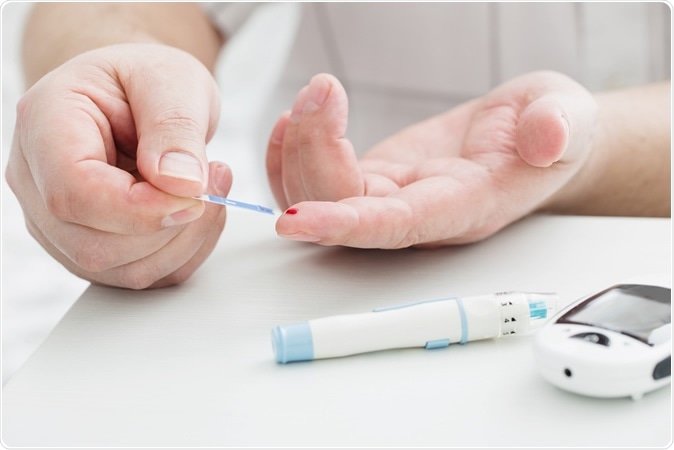The COVID-19 pandemic is rampaging across continents, leaving death, fear, and uncertainty in its wake. The virus is known to cause more severe illness and have a higher death rate in people who are already sick or immunocompromised, as well as the elderly. Several nations, states, and provinces have announced total lockdowns to try and minimize the impact of the virus.
With over 720,000 people affected so far, leaving nearly 34,000 dead, people with chronic medical conditions are naturally anxious and fearful. They wonder about their risk of becoming sick, as well as whether they can still get medical care and the medications they are currently on. One such condition is diabetes mellitus, in which the patient must often take the peptide hormone insulin with or without other medications to keep their blood glucose levels in check.
The American Diabetes Association says there is not enough data to show whether people with diabetes are more likely to get COVID-19 than the general population. The problem people with diabetes face is primarily a problem of worse outcomes, not a higher chance of contracting the virus.

Image Credit: Maya Kruchankova / Shutterstock
Are diabetic children at higher risk?
The European Society of Pediatric Endocrinology (ESPE) also says that there is no robust evidence that children with type 1 diabetes mellitus who have well-controlled blood sugar levels are at a higher risk for COVID-19 or severe illness. Moreover, children who catch the virus are typically at much lower risk for illness than adults.
Exceptions may exist in the case of children with poor control of diabetes or for children who are extremely obese, even though they are in good health otherwise. Such children may develop more complicated lung disease with COVID-19 infection. Such children should be cared for vigilantly to prevent this infection.
The usual preventive measures apply for both parents or caregivers and child patients: thorough and frequent handwashing, social distancing, and protective measures at all times. Online learning at home is likely to be a healthier option for children’s education at the present time.
If symptoms should develop in children with diabetes, medical advice should be taken over the phone to find out whether the child should be isolated at home to rest and recover, as is typically advised for mild cases, or should be taken to the doctor’s office. Management of the sick child in COVID-19 with diabetes follows the same “sick day” advice already outlined by the International Society for Pediatric and Adolescent Diabetes (ISPAD). The child’s endocrinologist should also be kept in the loop. Such children must have frequent monitoring for blood glucose and ketone levels, insulin must be continued, and the dosage increased as required.
Are diabetics more likely to catch the illness?
The American Diabetes Association says that in China, people with diabetes were much more likely to develop serious complications or to die of the infection – if one caught it, in the first place. Thus, prevention reduces the risk in these cases to below the baseline risk.
Like other viral infections, COVID-19 can cause the development of diabetic ketoacidosis in type 1 diabetics who have a failing pancreas. This can progress to sepsis and septic shock.
When to take alarm
As for others, diabetic patients should be careful to observe social distancing. The following are the emergency warning signs of COVID-19 in adults, and should prompt an immediate medical consultation:
- Breathing difficulty or shortness of breath
- Chest pain or pressure which is persistent
- New-onset confusion or difficulty in arousing to full consciousness
- Bluish discoloration of the lips or face
Will diabetics continue to get what they need?
Australia serves as a model in the area of ensuring people in isolation who have underlying medical conditions get the care they require.
In Australia from March 11, 2020, onwards, that the Department of Health has stated that neither insulin nor anti-diabetic medications are in short supply, nor any other products supplied through the National Diabetes Services Scheme (NDSS). As such, patients are advised not to buy increased supplies of any drug or product in order to stockpile it against future emergencies. Instead, diabetic patients may order their medications and other supplies, as always.
The various departments concerned with the care of patients and the supply of essential medications and devices are constantly communicating with each other and coordinating their services in order to ensure patients have access to up to date information. This will be crucial in allowing them to remain safe and healthy. There is also a nonstop hotline to call the government’s health information line in a time of need.
Telemedicine to the rescue
Secondly, the Diabetes Australia has passed on information from the government of Australia that it plans to provide telemedicine services which will be billed in bulk, to deliver medicines to patients’ doorsteps, to increase the budget to accommodate more staff to care for older patients and step up the capacity to provide medical services for aboriginal people living in remote places. To increase the efficiency of the deliver-to-home services, the government will allow pharmacies that can accept online prescriptions to participate.
The telehealth consultations under the Medicare services began from March 13, 2020. These online services will be provided by GPs, specialist doctors, nurses, and health workers allied to mental health services. Any Medicare beneficiary who is over 70, has chronic underlying medical illnesses such as diabetes mellitus, aboriginal people who are over 50 years, people with a weakened immune system for any cause, pregnant women, and those who need to look after their newborn infants, can avail of this consultation.